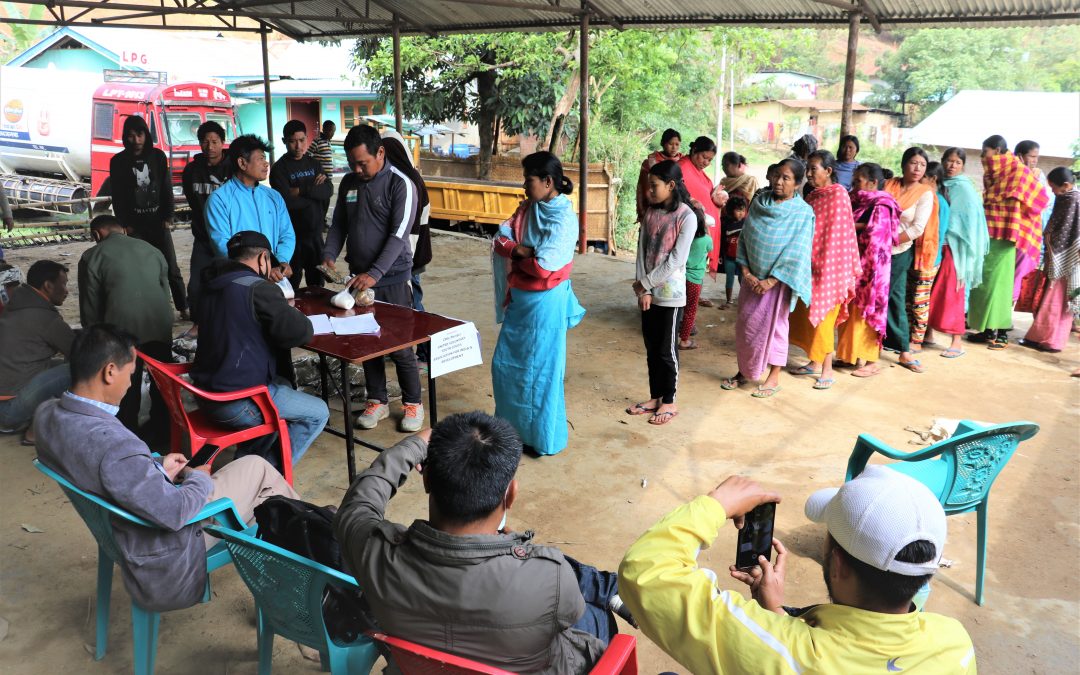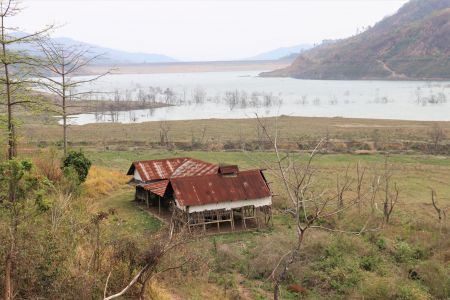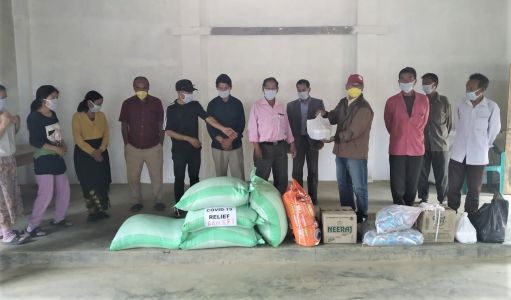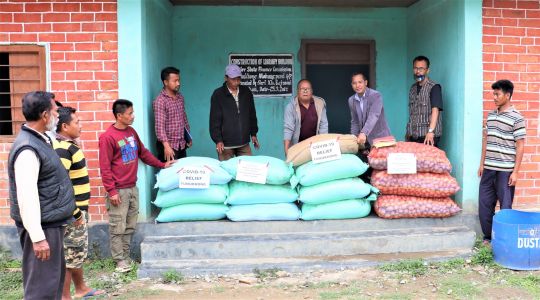This article is part of Reality of Aid – Asia Pacific’s COVID-19 Response Series, “Resisting Repression; Recovering Together”, which aims to document the struggles, best practices, and lessons learned, as well as share recommendations of RoA-AP members as they responded to the pandemic at the national or regional level. Read more stories here.
By Christina Lamremdik and Jiten Yumnam, Centre for Research and Advocacy – Manipur (CRAM)
COVID-19 IN MANIPUR: On March 24, 2020, Manipur in India’s North East reeled in much panic among its populace with the confirmation of its first COVID-19 positive case, a 23-year-old student returning from the United Kingdom. Since then, the state has recorded a steep rise in cases of the coronavirus, worsened by the relaxation of travel restrictions by the Government, which allowed operation of special trains and buses to transport natives of Manipur from other parts of India since first week of May. This led to an exponential surge in COVID-19 cases in Manipur. By the 30th of June, COVID-19 positive cases rose to 1,227 patients, while half a million positive cases confirmed in the whole of India. While no deaths have been recorded as of the end of June, fears of community transmission remain strong in Manipur.
THE LOCKDOWN AND COMMUNITY CHALLENGES: The Government of India has responded to the pandemic by imposing complete lockdown from the 23rd of March. The Government also imposed public curfew under Section 144 of the Code of Criminal Procedure, prohibiting movement of civilians during lockdown. The enforcement of lockdown, however, led to cases of human rights violations targeting common people.
Human rights defenders who voiced their concerns regarding the State’s handling of the situation on social media were arbitrarily detained. For instance, the police summoned Dr. Debabrata Laifungbam, President of Centre for Organization Research and Education on April 3 at the Imphal West Police Station with no arrest warrant to question him about his Facebook post[i]. Another example is the case of Dr. Ningthoukhongjam Haraba, a medical practitioner who was returning home from his COVID-10 duty. He was physically assaulted by two sub-inspectors of Manipur police on June 11[ii]. But more than arrest and assault, there were also reports on civilian killings under police custody. A widespread protest marred the streets of Tamil Nadu after a father and son were reportedly killed after arrest and torture while in police custody for violating the lockdown.
Apart from human rights abuses, the lockdown also heavily impacted the local economy. For example, a traditional market in Manipur managed by indigenous women has been closed, affecting their economic activity and crucial role in the community. Meanwhile, peoples who lost their lands due to unsustainable projects like the 105 MW Loktak Project, Mapithel Dam, Khuga Dam, etc. has been suffering more due to shortage of food and neglect from authorities. There is indeed lack of State support to address the economic impacts of the pandemic to the vulnerable and marginalized, specifically the workers, street vendors, and daily wage earners, among others.
The government’s negligence of health infrastructure affected their appropriate response to the rising cases of infection in Manipur as well as in other parts of India. While the Manipur government established seven Quarantine Centres (QCs) with additional 770 community QCs[iii], the QCs are marred with limitations. There was shortage of food, sanitary facilities, and inadequate testing facilities. On the 16th of May, doctors and health workers at quarantine facilities voiced their complaints about the inadequate provision of Personnel Protective Equipment (PPE) from the government[iv]. Many doctors and nurses treating COVID-19 patients at Churachandpur and Bishenpur QCs were thus infected. People then came to the QCs to protest, such as at the Presidency College Quarantine Centre at Motbung in Kangpokpi district over the lack of basic amenities, viz, water supply, electricity, and separate rooms despite the confirmation of positive COVID-19 cases in the facility[v]. The rooms in QCs are often packed with 2-8 patients, sometimes even more[vi].
COMMUNITY SUPPORT: Despite the shortage of food and neglect from concerned authorities, indigenous peoples’ access and management of their land and resources has proven to ensure their livelihood in difficult situations such as in this COVID-19 outbreak by providing food and medicine to neighboring communities. Villagers from each hill district in Manipur gathered their agriculture products and shared it with nearby villages, quarantine centres, and hospitals during the lockdown. To remedy the insufficient quarantine centres provided by the State, indigenous communities set up their own quarantine facilities to house returnees. Such generous response of the indigenous communities was made possible because of their traditional management of land and resources.
To aid in alleviating the impacts of the lockdown, the Centre for Research and Advocacy – Manipur (CRAM) also provided relief to several villages whose livelihood were undermined due to submergence of their land by the Mapithel Dam and 105 MW Loktak Hydroelectric Project, among others. Food items like rice, lentils, potatoes, salt, and sugar and sanitary items were distributed in April and May[vii]. CRAM coordinated with other organizations like the Social Upliftment Association to create awareness on safety measures and to provide food and sanitary items among marginalized communities which most vulnerable to COVID-19 infections, such as those living with HIV/AIDS as well as orphans, widows, elders, etc.
CONCLUSIONS: The sudden outbreak of COVID-19 has unveiled the poor medical infrastructure, food insecurity, and dependency from outside the State. Currently, the biggest concern of communities is the lack of adequate medical infrastructure and testing facilities and the limited capacity of hospitals to provide treatment for COVID-19 patients. The Government of Manipur should take urgent measures to strengthen the health infrastructure in all districts and create awareness, including in indigenous languages to reach all communities. Similarly, the Government of India should ensure timely provision of essential items like food supplies and sanitary items. Special attention should also be accorded to ensure adequate supply of safety equipment and other essential needs in quarantine centres.
Moreover, as evidenced by the community support documented above, the Government of Manipur should recognise that strengthening indigenous people’s food production system, protecting land and resources, improving necessary health infrastructure, and desisting unsustainable development processes in the State compose the rightful path to people-centred development of Manipur that leads to an effective and efficient response in emergency situations like this pandemic. The Government should also ensure full adherence to human rights standards in its response to COVID-19, protecting the people first and putting them at the core of any emergency response.
[i]COVID-19: NHRC sounded on Manipur rights defenders’ detention (2020, April 06), The Hindu.
[ii]AMNEWA condemns assault on doctor (2020, June 11), The Sangai Express.
[iii]Manipur Speaker runs quarantine centre without government funding. Sumir Karmakar (2020, June 04). Deccan Herald. Retrieved from https://www.deccanherald.com/national/east-and-northeast/manipur-speaker-runs-quarantine-centre-without-government-funding-845698.html.
[iv]Provide PPE to doctors, health workers at quarantine centers: Manipur speaker to govt (2020, May 16), Deccan Herald.
[v]Many fears of infection say inmates at Manipur quarantine centre. Vangamla Salle K S, (2020, June 11), East Mojo.
[vi]At the Manipur Quarantine Centre, I’m in, We Have to Arrange for Our Own Food, Bedding. Meiraba Mangang (2020, May 26), The Wire.
[vii]Relief works to several villages in four districts of Manipur (2020, April 27)




